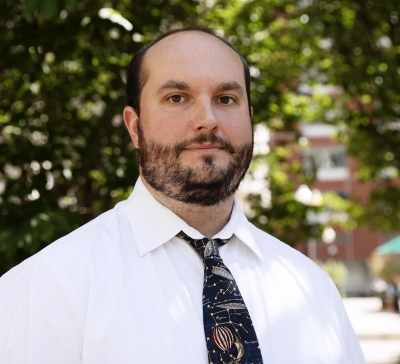
EMMA ASHER
In this series, we speak with instructors who lead different sections of the Core Curriculum to learn what they love about engaging with College students. This month we chat about Frontiers of Science with Nicholas Luber CC’18, a lecturer in the Department of Astronomy & Astrophysics. He has been teaching the Core as a member of the Columbia Science Fellows program since July 2022. Luber earned a Ph.D. in 2022 from West Virginia University.
What is the best part about teaching the Core Curriculum?
I really enjoy having a sort of shared knowledge and goal with the students. I actually start my first seminar with a slide that says, “Why Columbia? Why the Core?” and then it’s a frank discussion about the pros and cons. I do that because this is something that we’ve opted into as a group. They’ve chosen to be here and do this. I sometimes joke with them: “I went to the College, too, so I know that you thought about the Core before you came here.” But I do really think there is strength in that shared knowledge.
I also like to start every seminar with an order of magnitude question, for which they have to do some silly calculations. It gets students to think about scientific and mathematical concepts alongside the other things that they’re doing. So, the first one was, “How many bricks are on College Walk?” And being that Frontiers is a part of the Core, I also ask them, “How many words are you going to read in Lit Hum this year?” And that’s the coolest part about teaching the Core: making the connections to the other Core classes. Because the Core is something that everyone takes, you can make those connections without anyone feeling left out.
How do you innovate and/or bring your own spin to Frontiers of Science?
I personally think that looking into science for science’s sake is super cool, but I understand that that’s not everybody’s motivation, and I appreciate that fact. So what I try to do is connect something in every seminar to something societal — to something that students will actually have to grapple with in their lives. So for example, the third unit is “Molecules in Life”; we discuss DNA and gene editing. So I do all the stuff that we’re supposed to do, then I spend the back half of class debating the ethics of gene editing. That way, the science feels more real and important to them.
What are you teaching that feels especially relevant for this year?
We live in a very uncertain scientific funding state right now, and that has different degrees of importance and relevance to society. But without a doubt, I think the most important thing is the science around global warming and climate change. We spend two weeks at the end of the semester discussing the scientific markers behind anthropogenic climate change. And then I have them draft policies as a group, which they could present to the United Nations as to how the world could work together on these issues. I think that has become even more important as funding is being cut away from the edges — we need to remember what’s important and why.
What has been your favorite Core Curriculum teaching moment?
I really do try to focus on how students can use science in their lives, but at my heart, I am a silly scientist. So I always take my class out to dinner once a semester; 20 or so of us go to V&T, which is a lot of fun. This past semester, we were all just chatting informally around the table. They started asking about my research, and then asking a series of astronomical questions. They went further and further, and finally they got to the point where my answer was, “I don’t know.” And it was, “It’s not just that I don’t know. It’s that nobody knows.” It’s very hokey, but it was like, they had reached the frontier of science.
I love that that happens every semester, when the students are genuinely curious enough to hit the frontier of human knowledge. It’s a very exciting point to get to.